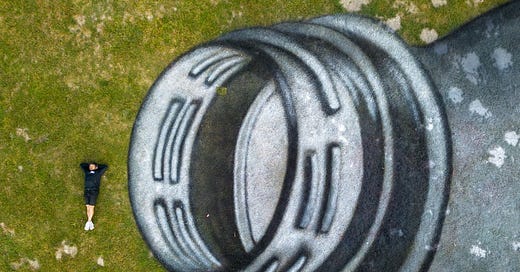
Welcome to your weekly edition of the Top 5 articles we’ve read this week. Each week, we read dozens of articles in the hope we find essays and reporting that speak to big ideas, trends, future looks, and incredible human stories. We hope you enjoy our list, and do always let us know if you have a suggestion or a recommendation! Please also consider becoming a paid subscriber if this is one of those newsletters you open up all the time or look forward to each week.
Also, if you haven’t already done so, please pre-order Michael’s book, “The Spirit of Our Politics: Spiritual Formation and the Renovation of Public Life.” Pre-orders are so helpful!
“Making Peace, Making Worlds” (Comment Magazine)
Because while reflecting on the 25th anniversary of the Good Friday Agreement, Christa Ballard Tooley says, “Peacemaking, here, is a practice for God’s children to take up. His blessing does not name those who try to achieve their own inner peace, nor those who receive peace from God, but rather those who make peace with and for others. Theologian Justo González calls this “for-otherness,” the everyday habit of the kingdom of heaven, whose end, ultimately, is shalom. Peacemakers are called children of God because, in likeness with God, they are the reconcilers who mend relationships and heal wounds in our world.”
“Kids Deserve to Take Up Space Too” (The Cut)
Because Amil Niazi reflects, “Something seems to have shifted post-lockdown, and our appetite for empathy and grace in communal spaces has withered. Our tolerance for the discomforts of the outside world, after an extended overabundance of inside comforts, is now paper-thin. I feel it acutely as a parent; in every public interaction and space, I’m holding my breath, watching the glares, and listening to the muttered grievances, every encounter underscoring that we shouldn’t be here, that we’re a nuisance and don’t belong.”
“Suddenly, It Looks Like We’re in a Golden Age for Medicine” (NYT Magazine)
Because David Wallace Wells writes, “The pandemic has exhausted many Americans of medicine, and it has become common to process the last few years as a saga of defeat and failure. And yet these brutal years — which brought more than a million American deaths and probably 20 million deaths worldwide, and seemed to return even the hypermodern citadels of the wealthy West to something like the experience of premodern plague — might also represent an unprecedented watershed of medical innovation.”
“The Forgotten Element of Strategy” (The Atlantic)
Because Nadia Schadlow observes that the US government is falling behind on innovation and that “…there is an additional approach that we might pursue: incorporating time as a foundational element of strategy. In practical policy terms, this would mean including time as an input into policy promises and initiatives, just as we do other factors, such as funding and personnel.”
“Prigozhin’s coup attempt unleashes chaos on Russia” (Vox)
Because Yevgeny Prigozhin, head of the Wagner Group in Russia, tried to challenge Russia’s regime this weekend. Vox explains the situation.



